The Nexus 7 (2013) Review
by Anand Lal Shimpi on August 22, 2013 6:00 PM ESTCPU Performance
The while the original Nexus 7 was fast for the money, the new Nexus 7 is just fast. Moving away from NVIDIA to Qualcomm, ASUS and Google settled on the APQ8064 Pro. Although we originally assumed this would be a quad-core Krait 200 based SoC, Brian's teardown revealed the part number 8064-1AA. What's special about that part number is it implies newer Krait 300 cores, making the SoC effectively a Snapdragon 600.
The CPU cores can run at up to 1.5GHz, putting it a bit lower than what we've seen from Snapdragon 600 based phones (e.g. HTC One tops out at 1.7GHz, while the US SGS4 hits 1.9GHz).
I was curious as to the impact of the lower frequency when combined with the potentially higher chassis TDP so I compared the Nexus 7 to the US Galaxy S 4. I turned to Geekbench because it offers a nicely woven mixture of single and multithreaded benchmarks, letting me look at peak available single core performance as well as what happens when multiple cores are active and working.
In this first graph we're looking at the first Krait 300 core running the workload. I've zoomed in to a small portion of the benchmark so we can get a better idea of CPU behavior:
The Nexus 7's CPU0 is almost always pegged at 1.5GHz whereas we see a lot of bursty thermal management on the smaller SGS4. This isn't unexpected, but what ends up happening is the sustained performance advantage drops from a peak theoretical max of 26% down to a more reasonable average gain of ~8%.
I was curious to see if multithreaded workloads showed any different behavior. Here we're looking at the fourth CPU core (CPU3). Note that it's not always active, which is why you see parts of the graph drop down to 0KHz. Once again we see similarly static behavior from the Nexus 7. Even with all four cores active, when you need the performance the Nexus 7 delivers a full 1.5GHz. These tests are short enough where we don't see tremendous swings in frequency, but once again we do see some frequency modulation in a smaller chassis.
The end result is that the Nexus 7's 1.5GHz Krait 300 cores are slower than what you'd get in a Galaxy S 4, however the gap isn't nearly as large as you'd expect it to be thanks to the larger chassis and how the platform is tuned. The Nexus 7 can run at 1.5GHz more consistently than Snapdragon 600 based phones can run at 1.7/1.9GHz.
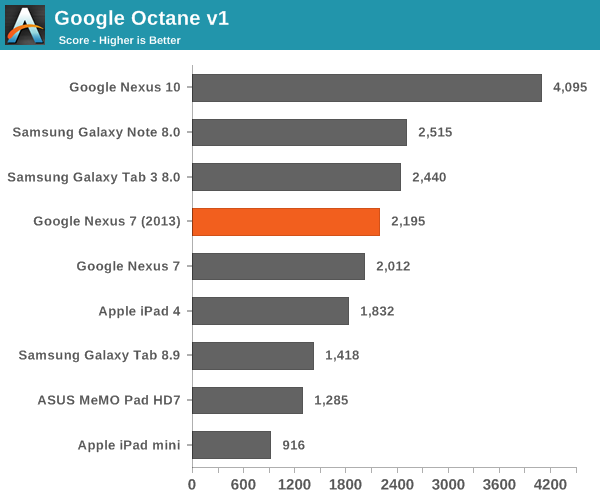
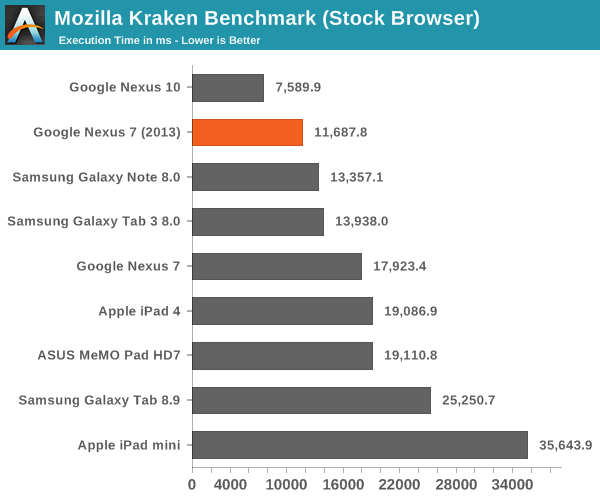
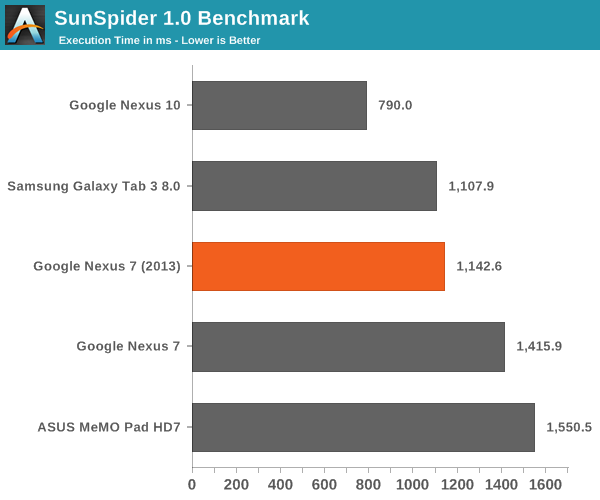
The GPU
Qualcomm seems to be frequency binning here, which is standard industry practice. Using binning to create these different SKUs gives Qualcomm pricing flexibility and also gives it the option to give large customers special treatment.
On the graphics side Qualcomm's Adreno 320 GPU makes an appearance. Clock speeds are also limited to 400MHz, compared to 450MHz for the high-end Snapdragon 600 implementations we've seen.
The APQ8064-1AA's dual-channel memory controller is populated with four x 16-bit DDR3L-1600 memory devices, giving the Nexus 7 a healthy amount of memory bandwidth. Peak memory bandwidth available to the APQ8064-1AA is 12.8GB/s, equalling what's available to Apple's A5X in the 3rd generation iPad with Retina display. Tons of memory bandwidth is obviously a pre-requisite for driving a high resolution display, and the combination of DDR3L-1600 and the Adreno 320 GPU delivers a butter smooth UI in all well written Android apps.
Although CPU performance is somewhat middle of the road compared to the rest of the landscape, GPU performance is faster than any other Nexus device on the market - and pretty much faster than any other similarly sized tablet:
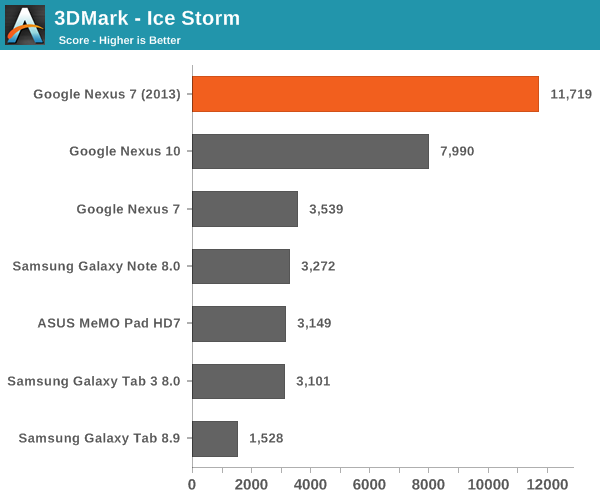
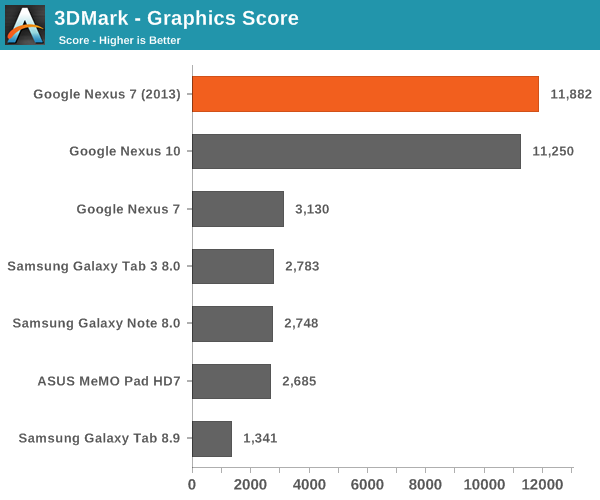
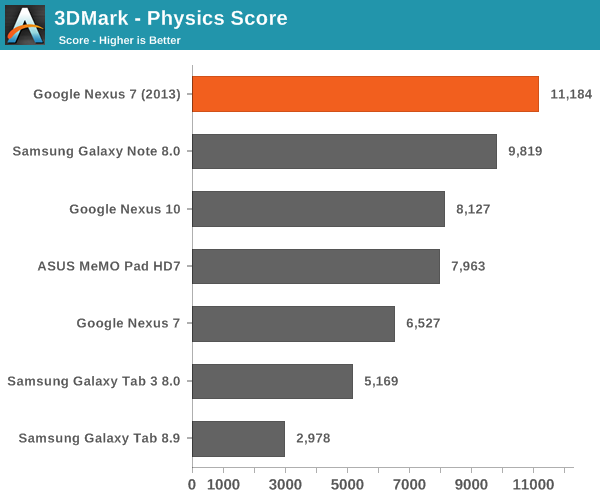
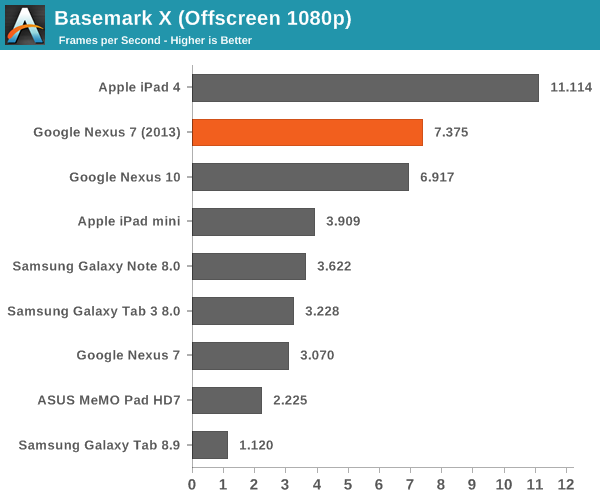
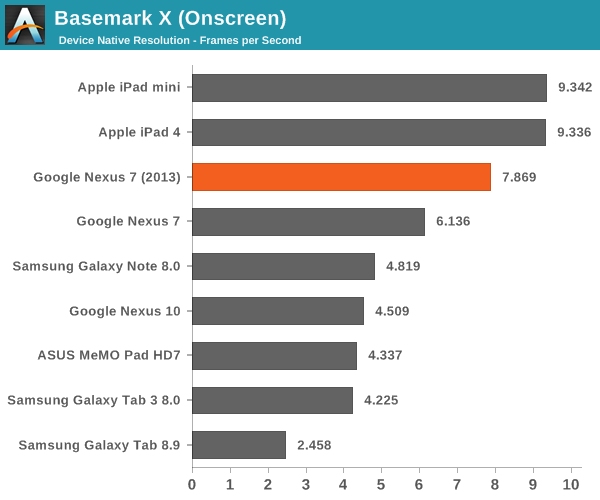
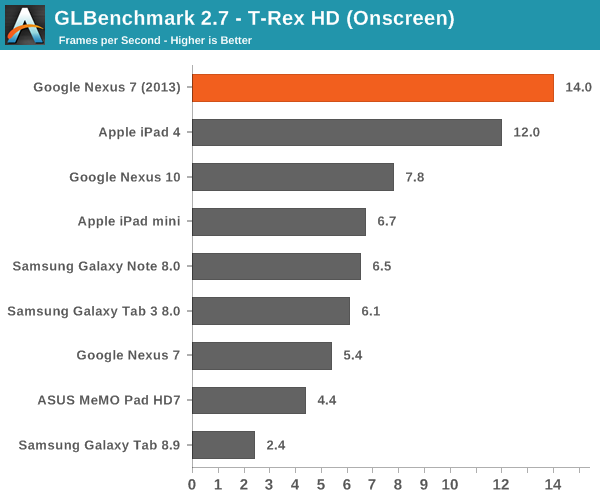
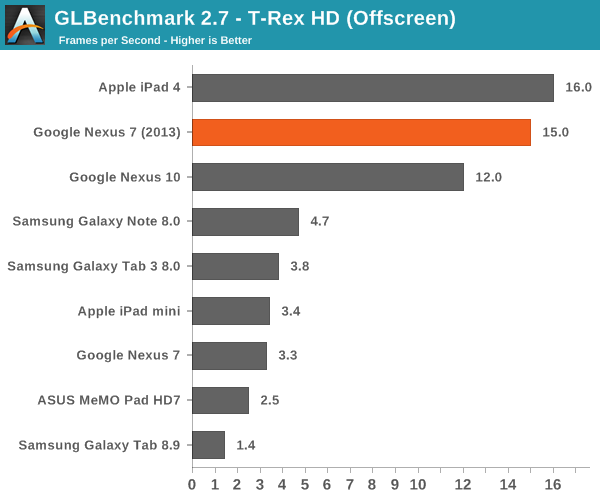
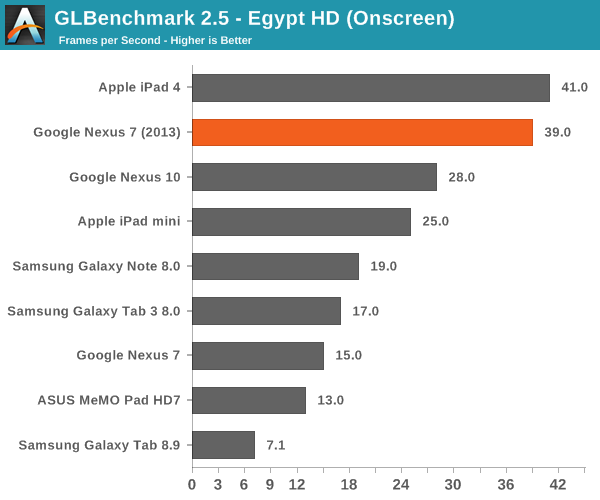
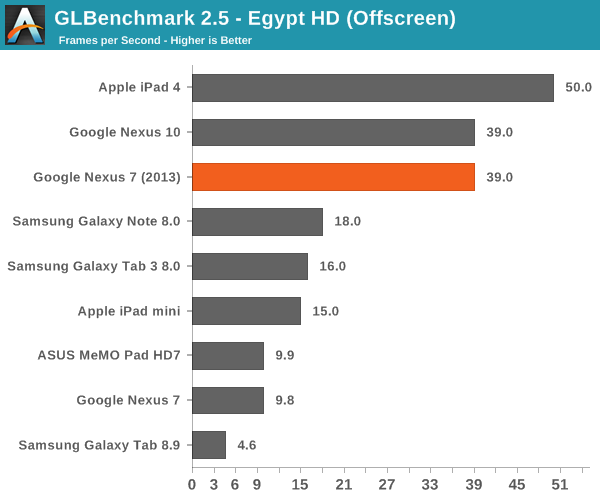
I played Modern Combat 4 as well as Shadowgun, both demanding 3D titles, on the new Nexus 7. Both titles appeared to render at the Nexus 7's native 1920 x 1200 resolution, and both appeared to do so at around 30 fps.


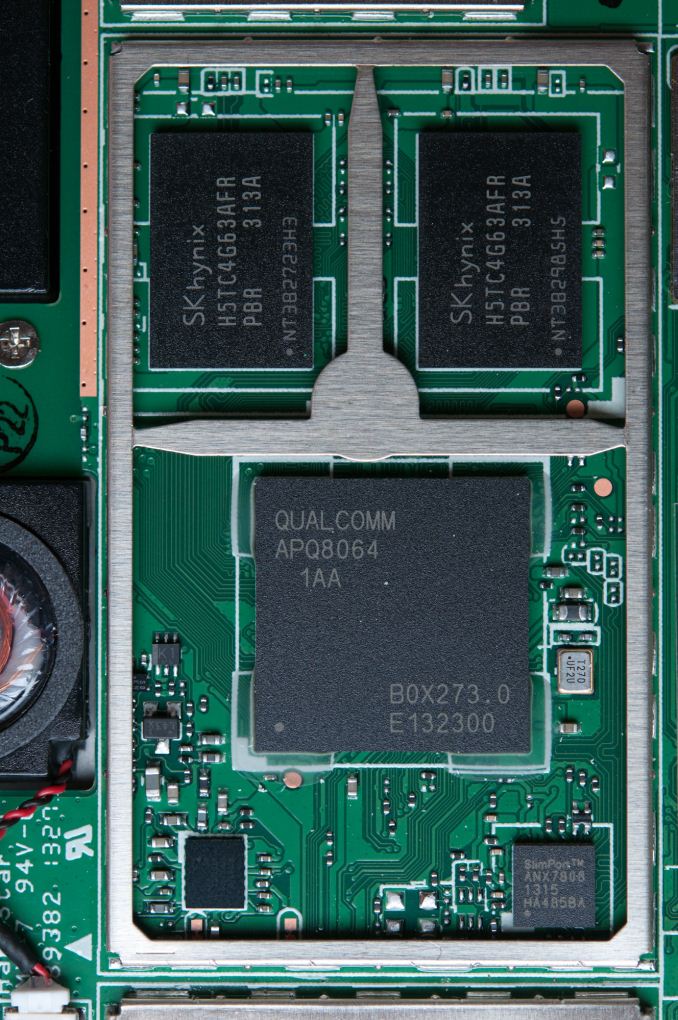
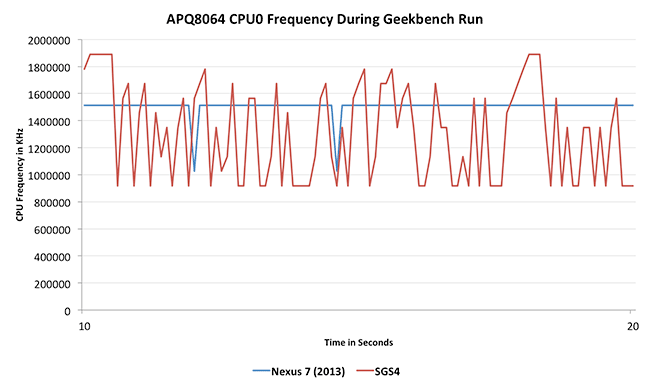
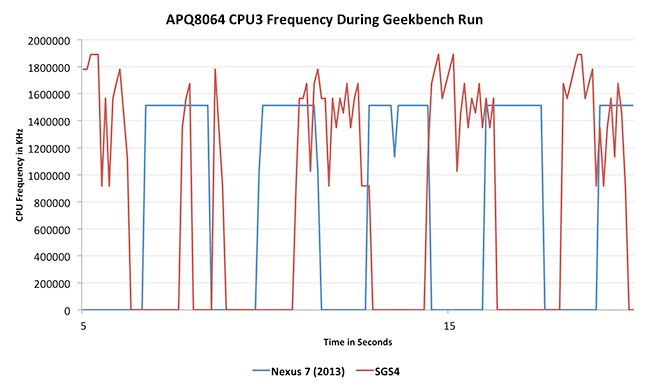








202 Comments
View All Comments
RYF - Thursday, August 22, 2013 - link
It is always important to benchmark and compare against the best-selling 7 inch tablets. What is the point of comparing N7 against the half-hearted efforts shown in the recent Galaxy Tabs?I am not a fan of iOS. But I have to state that iOS is still, by far, the easiest mobile OS to be used by the majority.
Impulses - Friday, August 23, 2013 - link
It's not even about that, I appreciate the comparison too despite wanting nothing to do with any iOS device... Apple is still a premium hardware company so the comparisons ate entirely relevant. The day their devices aren't built up to snuff or their market share falls as far as Mac share has at times then the comparisons become irrelevant.Impulses - Friday, August 23, 2013 - link
Besides, Anand can mention Apple every other paragraph and the general comparison is still more unbiased (not to mention the review more in depth) than the vast majority of sites can manage...ESC2000 - Wednesday, August 28, 2013 - link
I don't think the person complaining about Apple bias in this article is referring to the fact that the benchmarks included ipads. I think they are referring to the comments like (I'm paraphrasing) 'the new nexus is a downright Apple way to rev a product' as well as the constant comments about how aluminum is premium.People want to hear comparisons to the competition in reviews but it doesn't make sense for the review to be touting another product. No more backhanded compliments please ('a downright Apple way. ..').
lmcd - Thursday, August 22, 2013 - link
I came out of this review with "there's no way in hell to buy an iPad Mini right now and feel good about yourself."So, link me to what you just read please?
sweenish - Thursday, August 22, 2013 - link
Same.This review in no way made me think that an Apple tablet was more deserving of my money.
jeffkibuule - Thursday, August 22, 2013 - link
Considering Apple's tablets are 9 months old at this point, is there any different conclusion a reasonable person should make other than wait?ESC2000 - Wednesday, August 28, 2013 - link
I didn't wait. Whatever Apple releases I know it will cost more and probably have less than the nexus 7 2013... or maybe it will be equivalent to the nexus and cost 2x as much and charge $100 for each 16 GB increase in storage ($40 for 16 GB increase on the nexus) not to mention $150 extra for cellular.Seriously what is there to wait for?
smartypnt4 - Thursday, August 22, 2013 - link
Obvious troll is obvious.Diorarat - Wednesday, October 2, 2013 - link
No offence but I'm not catching on what you mean by biased. Well what can you compare the N7 with the other than the iPad. You have to compare it with something and the iPad is definitely the best comparison. There are great android tablets in the market but I don't think they're as familiar to the consumers as the iPad. Besides, I think Anand is being fair to praise hardware that is excellent whether apple or android.